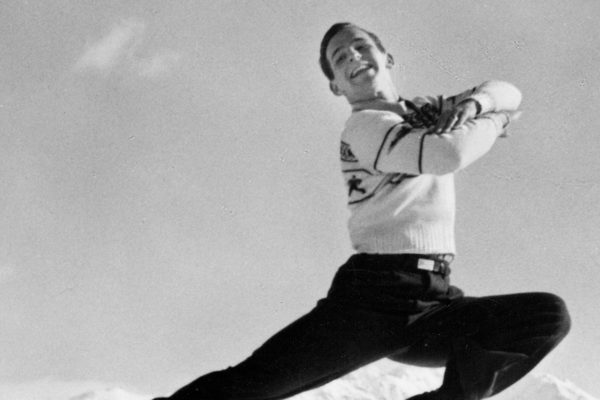

February 5, 1948. That day marked a significant moment for the figure skating community in the USA, as they experienced a success that had previously seemed unattainable. Before this date, American male figure skaters had never secured a gold medal in the Olympic Games. Additionally, the sport had a different level of acceptance in American households before this pivotal date. However, that February day altered everything. Nearly 77 years ago, on that day in February, an individual from Englewood, New Jersey, achieved greatness in the sport and put the USA on the international skating map. Who was this person? Can you guess the name? Yes, it’s the renowned Dick Button.
Dick Button had two back-to-back Olympic gold medals from the St. Moritz Olympics and the Oslo editions. He didn’t win the medals in an empty rink. His unequaled abilities to perform double axel made him someone to keep off from the podium. Also, in Oslo, Button was the first figure skater to land the first triple jump (a loop). He was an all-around figure skater who knew how to entertain the audience. In an era of the 1940s, the audience didn’t have much scope to think about the complicated twists and turns in figure skating. So, the moves had to be compelling and easy to grasp.
Dick Button was the first name to bring such moves. He relentlessly captured the mood and kept everything on the table. However, on January 30 this year, the sporting realm lost him. At 95, he left the mortal world, leaving his examples behind to motivate the generations. His entire life story can serve that cause. Well, a professional career that had two Olympic gold medals and five consecutive world championship titles.
ADVERTISEMENT
Article continues below this ad
But as you can expect, Dick Button’s way had not been smooth sailing. Rather, before his Olympic victory in 1948, he had to uproot a norm active in the figure skating sport to make his way forward. And what was that? The report published in CT Insider explained it in detail. It was about donning the dress on the skating rink. The report claimed, “Button said he shocked people back in 1947 when he decided to go against the “very, very formal” norm and put on a white mess jacket while skating, instead of a black one, earning comments like, “What does he think he is? A waiter?”” So, before him, the figure skating realm had a taboo on seeing the white dress in figure skating sports. Button, however, had hardly been bothered by that.

He continued to don the white jacket for the next year until he realized something off the route. Such as? Later, Dick Button realized the low visibility of white jackets in the snowy scenery of the outdoor stadium where he was competing. So any way out? Well, while Dick Button was in the mix, you could expect to see something different. No?
Soon, the legend opted for the once-standard black jacket. But by then he had already made his position as someone donning the white jacket. So then? Did the community accept him in a new avatar? Yes, it did. And once again, he became the one who stood out. But it was not the first time the figure skating luminary stood up to break the shackles of prediction. In fact, since his childhood, he had been doing that.
What’s your perspective on:
Did Dick Button's bold fashion choice in 1947 redefine American figure skating forever?
Have an interesting take?
ADVERTISEMENT
Article continues below this ad
Dick Button knew to fly over the barricades
“When Dick Button started skating at the age of 12, he was allegedly told by his teacher that ‘hell would freeze over before he became a real skater’. Thankfully, Button wasn’t easily deterred and went on to become a legend in his own lifetime.” Meanwhile, the screen shows Button skating in the arena, like a kid gamboling. The clip was from a documentary on his life. It reflected his years in developing himself as a skater. It claimed that since his early days, Button nurtured his love for the sport without much care for predictions. And what were those predictions?

ADVERTISEMENT
Article continues below this ad
According to Dick Button’s book, his teacher didn’t have any expectations of him doing well in a sport like figure skating. He wrote, in fact, “Taking one look, the teacher said I would never learn to skate until a ‘snowball learned to live in Hades.'” But here was the student’s mindset. In the upcoming years, Button broke his teacher’s prediction by becoming the youngest American male to claim the gold medal in the 1948 Olympics. The first one on many lists! Aren’t those the best motivational stories? The legend left those behind in bunches.
ADVERTISEMENT
ADVERTISEMENT
ADVERTISEMENT
ADVERTISEMENT


Did Dick Button's bold fashion choice in 1947 redefine American figure skating forever?